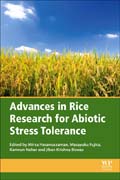
Advances in Rice Research for Abiotic Stress Tolerance
Hasanuzzaman, Mirza
Fujita, Masayuku
Nahar, Kamrun
Biswas, Jiban Krishna
Advances in Rice Research for Abiotic Stress Tolerance provides an important guide on recognizing, assessing and addressing the broad range of environmental factors that can inhibit crop yield. As a staple food for nearly half of the world's population, improving and increasing crop yield is imperative. This book presents current research on abiotic stresses, including extreme temperature variance, drought, hypoxia, salinity, heavy metals, nutrient deficiency and toxicity stresses. Going further, it identifies a variety of approaches to alleviate the damaging effects of abiotic stress on rice, along with current advanced processes being used to develop abiotic stress tolerant in rice crop. The book provides an important reference for those ensuring optimal yields from this globally important food crop. Covers aspects of abiotic stress, from research, history, practical field problems faced by rice, and the possible remedies to the adverse effects of abiotic stressesProvides practical insights into a wide range of management and crop improvement practicesPresents a valuable, single-volume sourcebook for rice scientists dealing with agronomy, physiology, molecular biology and biotechnology INDICE: 1. Abiotic stress - A general outline2. Rice production under changing climate - past, present and future3. Relative tolerance of rice species and genotypes to abiotic stress4. Seasonal variability in abiotic stress responses in rice5. Spatial variability and magnitude of major stresses across the rice growing environments of South and South East Asia and Africa6. Plant growth and morphological changes in rice under abiotic stress7. Abiotic stresses-induced physiological alteration in rice 8. Abiotic stress and rice grain quality9. Abiotic stress signaling in rice crop10. Rice responses and tolerance to salt stress11. Rice responses and tolerance to drought stress12. Rice responses and tolerance to waterlogging and flooding13. Rice responses and tolerance to high temperature14. Rice responses and tolerance to cold stress15. Rice responses and tolerance to elevated ozone16. Rice responses and tolerance to UV-radiation 17. Rice responses and tolerance to metals/metalloids toxicity18. Recent advances in arsenic accumulation in rice 19. Approaches in improving photosynthesis in rice under environmental stress20. Physiological mechanisms of rice to cope up with nutrient deficiencies21. Abiotic stress-induced oxidative stress in rice22. Approaches to enhance antioxidant defense in rice23. Use of plant nutrients in improving abiotic stress tolerance in rice24. Use of phytohormones in improving abiotic stress tolerance in rice25. Use of exogenous protectants in improving rice tolerance to abiotic stresses26. Use of osmolytes in improving rice abiotic stress tolerance to rice27. Role of polyamines in improving abiotic stress tolerance in rice28. Recent development in rice varietal development for abiotic stress tolerance29. Recent advanced in biotechnological tools in improving abiotic stress tolerance in rice30. Molecular mechanism in improving rice abiotic stress tolerance 31. Use of QTL in developing abiotic stress tolerance in rice32. Use of molecular markers in identify abiotic stress responsive genes in rice33. Omics approaches in developing abiotic stress tolerance in rice34. Agronomic approaches to improve rice production under abiotic stress35. Water management in rice crop grown under adverse condition36. Environmental and genetic control of its content in rice grain37. Role of policymakers in improving rice adaptability to adverse environment
- ISBN: 978-0-12-814332-2
- Editorial: Woodhead Publishing
- Encuadernacion: Rústica
- Páginas: 800
- Fecha Publicación: 01/10/2018
- Nº Volúmenes: 1
- Idioma: Inglés
